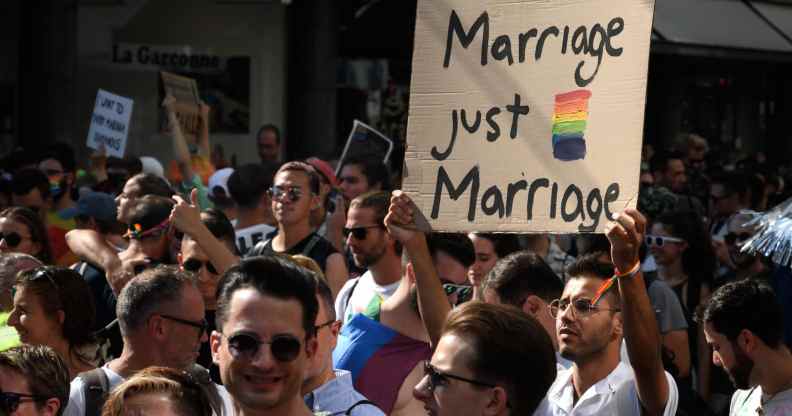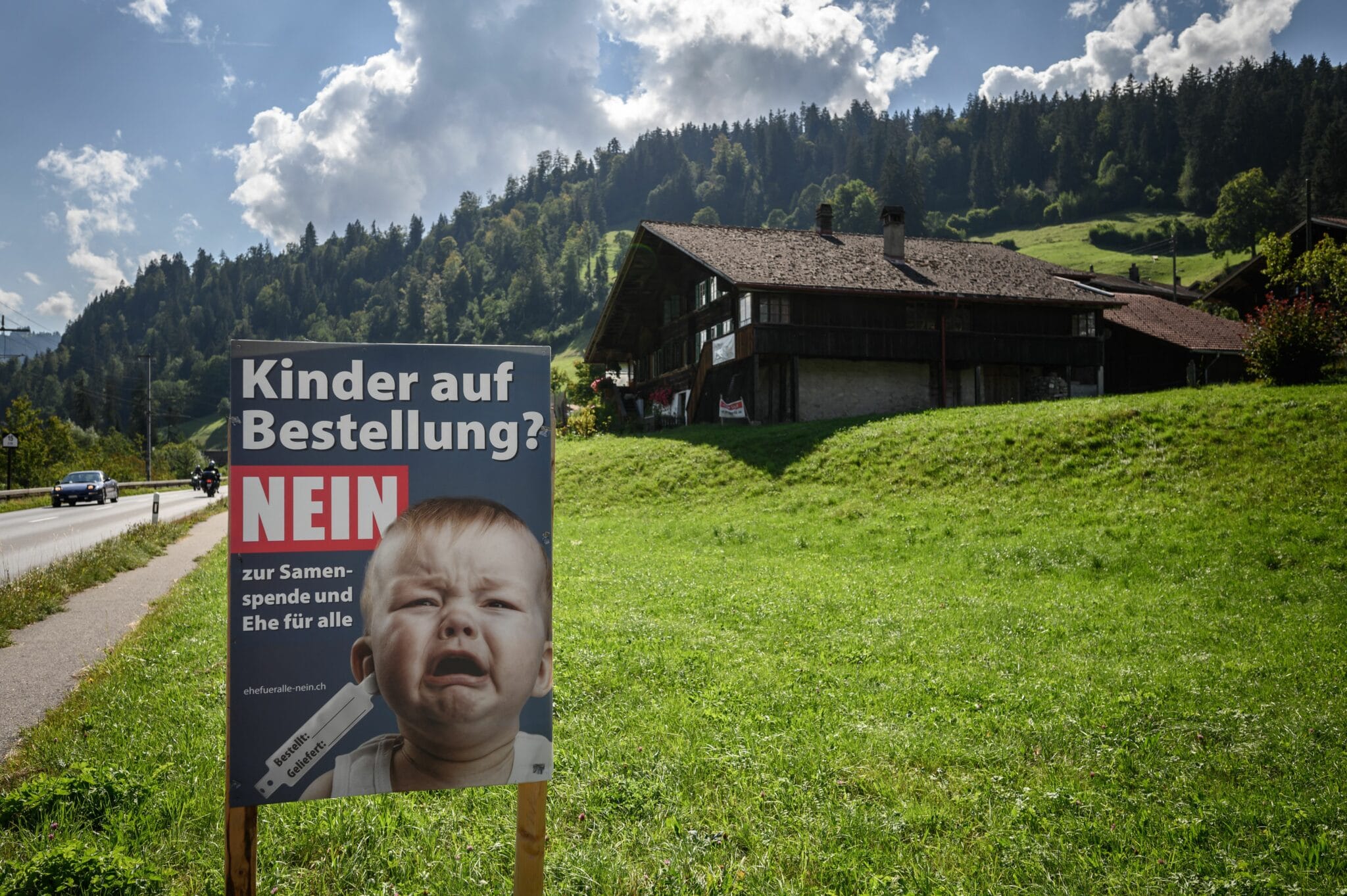Switzerland prepares for historic referendum on marriage equality after a long, bitter fight

Switzerland’s LGBT+ community marches in Zurich Pride ahead of a nationwide vote on equal marriage (Fabrice Coffrini/AFP/Getty)
On Sunday (26 September), Switzerland heads to the polls for a landmark vote on same-sex marriage, the culmination of eight long years of drawn out debate and intense campaigning.
The nation is one of the last western European countries without marriage equality and only introduced its first law banning anti-LGBT+ discrimination as recently as February 2020.
The upcoming national referendum represents a huge leap forward for civil rights: as well as opening up same-sex marriage it offers the chance for same-sex couples to adopt children, and for lesbian couples to access sperm donations.
Today an overwhelming majority of Swiss are in favour of the changes, but it’s been a slow journey getting there. So why has Switzerland’s battle for LGBT+ equality taken so long?
“The view from outside of Switzerland is that it’s a bit better off than it actually is,” said Roman Heggli, an activist for Swiss LGBT+ organisation Pink Cross, speaking to PinkNews.
“We still have a lot of homophobia, a lot of hate crimes and the acceptance of queer people isn’t that great. We’re not protected fully by the law. Unlike the Netherlands or Belgium, where [LGBT+ acceptance] is in the middle of society, that mindset isn’t as strong here. We still have a very strong, conservative part of society that is pushing against it all.”
How can it be that the majority defines a minority?
The problem lies in part with Switzerland’s system of direct democracy, which allows the public to veto parliamentary decisions via referendum if they collect 50,000 valid signatures within 100 days of the official publication of the act.
When it came to marriage equality, over 61,000 conservative critics rushed to block the law. It didn’t matter that studies showed around 82 per cent of people supported same-sex marriage; the opponents surpassed the threshold to force a referendum.
“Of course there’s always the question: ‘How can it be that the majority defines a minority?'” asked Maria von Känel of the Swiss Rainbow Families Association.
“Direct democracy has lots going for it – it includes everyone in the discussion, but that also means that these types of developments and advances take a long time and there’s always the risk that the majority gets to define the quality of life of a minority.”
Marriage equality bill was first introduced in 2013
For LGBT+ campaigners like her and Heggli, it’s meant the road to marriage equality has been painfully slow.
The first, early version of the bill was introduced in 2013 by the Swiss Green Party. At this point full marriage equality was the law of the land in Iceland, Norway, Sweden, Denmark, the Netherlands, France and Belgium, but it was still far away for Switzerland.
The only option for Swiss same-sex couples was (and still is) civil unions, which aren’t on the same footing as marriage in terms of fertility treatment, adoption and citizenship.
The bill was met with almost a decade of debate and modifications as the country’s far-right parties fiercely opposed it, declaring it “intolerable to want to place marriage on an equal footing with any form of cohabitation”. Further questions over whether enshrining marriage equality into law would mean amending the country’s constitution.
There was finally a breakthrough in December 2020 when the Swiss parliament approved the bill, which by this time had been seven years in the making.
But advocates knew there was inevitably one last hurdle to come with the referendum, bringing with it a highly-charged campaign that’s thrust ordinary LGBT+ people into the spotlight.

A campaign sign in Zweisimmen reads: ‘Children on demand? No to sperm donation and marriage for all’ (Fabrice Coffrini/AFP/Getty)
“The anti-equality campaign has at times become quite threatening,” von Känel said. “They were sending out fake news, spreading misinformation about the development of children, very harmful posters saying there will be a future without fathers and of a generation of damaged children. It has affected us, our friends and our families.”
She says Swiss LGBT+ helplines are now receiving five times as many calls as the referendum drives hate speech against queer people, whose basic rights to parenthood have been equated with “deleting” fathers.
“But at the same time there is this other side,” von Känel said. “We are feeling great support from people who are speaking out for us: singers, athletes and other public figures who had never spoken out for us before.
“There are children’s and family organisations, Catholic women’s groups which are standing side by side with us on the front line, asking for equal rights and marriage equality. This is happening,” she smiled.
“I think it was a huge opportunity for us as a community to be in the spotlight and be visible, to really show how we live, how we are, and to be role models for young people,” Heggli agreed.
Even big companies have got involved, uniting to share joint statements of support for the LGBT+ community. “This was another first,” Heggli said. “Usually companies don’t get involved in political campaigning, there is a boundary there, but for marriage equality they did.”
The Swiss government has emphatically backed marriage equality and the most recent polls indicate that at least 63 per cent of the public intend to vote in favour.
However, as many as 35 per cent say they plan to vote against it, and with LGBT+ rights being such an emotive issue in conservative circles the outcome remains uncertain.
Von Känel knows this, but she’s optimistic. Whatever happens on Sunday, something has shifted: never before have so many in Switzerland publicly supported same-sex marriage.
“I just can’t wait till Sunday, because after so many decades of advocacy, the public is finally gaining an understanding of our love and our lives. We are now being seen as equal and deserving of equal rights as the rest of society,” she said. “So for that reason, I’m very positive. I have no fear.”

